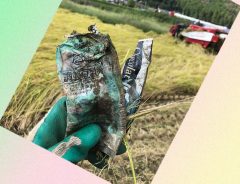
Source: Shiretoko World Heritage Conservation Center (@shiretoko_whc) | © Shiretoko Nature Foundation - image reproduced with permission
Shiretoko World Heritage site staff chide litterbugs after an increase in discarded waste
- Tags:
- Conservation / Littering / Shiretoko / Trash
Related Article
-

Why do rich Japanese people throw out less trash? Japanese TV announcer gives theory
-

Japanese rice farmer frustrated with litterers makes an earnest plea on Twitter
-

Japanese City Official Arrested For Throwing Out Trash Completely Naked
-

Famous Shibuya Crosswalk Halloween Party Falls To Chaos After Truck Flip, Groping, And Up-Skirt Photography
-

An Artistic (And Hilarious) Way To Get People Out Of The Shower – And It’s For A Good Cause
-

Mountaineer shocked by foul smell in Japan’s “haunted forest”


Japan has a reputation for cleanliness. School children are tasked with cleaning their classrooms, and company employees keep offices spotless. In recent years, Japanese lifestyle guru Marie Kondo became something of an international sensation evangelizing the benefits of a tidy lifestyle.
Indeed, cleanliness and thrift are espoused throughout the country. Take for example, the people of Kamikatsu in Shikoku who are working to establish a waste free city. On the other hand, as households prepare for their annual New Year’s cleaning,robots are increasingly employed to sanitize public facilities. What’s more, residents at wit’s end over stinky public toilets lobbied government officials in May to spruce things up—a likely futile effort if undertaken in my home country.
Nevertheless, issues remain. While cleanliness is certainly a public virtue, many likely cut corners behind closed doors. The country also tosses an inordinate amount of plastic, which may end up in the ocean. Strict expectations like “gomi mochikaeri,” taking your trash home, and limited public waste boxes also lead consumers to litter more than they’d care to admit.
In short, there is room for improvement. Unfortunately, the Shiretoko Nature Foundation in Hokkaido understands this all too well. The organization is engaged in wildlife conservation, environmental education, and research. However, irked members recently published an online post detailing the excessive amount of waste dumped in the World Heritage site throughout the pandemic.
Trashy Tourists
Shiretoko National Park is considered one of the most scenic and unspoiled national parks in Japan. Located on Shiretoko Peninsula in eastern Hokkaido, it is home to various wildlife, including brown bears, deer, and foxes. Visitors typically enjoy trekking, bird watching, and views of Mt. Iozan volcano and the park’s numerous lakes.
The site is perennially popular; however, its draw has resulted in problems throughout the COVID-19 outbreak. Despite a notable drop in tourists, an excessive amount of waste has been found by members of the Shiretoko Nature Foundation. Among other things, members found raw fish in a Styrofoam cooler and discarded plastic bags.
Reproduced with permission from Shiretoko World Heritage Conservation Center (@shiretoko_whc) and the Shiretoko Nature Foundation
Reproduced with permission from Shiretoko World Heritage Conservation Center (@shiretoko_whc) and the Shiretoko Nature Foundation
Disappointed staff wrote:
[The individual who dumped this trash should know] Alongside the road to Goko lake in Shiretoko park, a box of small fish was illegally dumped. A lot of effort was wasted cleaning this, and it was damaging to the wildlife.
Don’t Feed the Bears
On separate occasions, members of the foundation have found other raw foods like tangerines and bean sprouts, sometimes held in plastic bags. This type of waste is particularly worrisome as brown bears may consume it and develop a taste for human food. Bears also gain a taste for plastic bags and become more likely to approach humans visiting the park.
Reproduced with permission from Shiretoko World Heritage Conservation Center (@shiretoko_whc) and the Shiretoko Nature Foundation
Reproduced with permission from Shiretoko World Heritage Conservation Center (@shiretoko_whc) and the Shiretoko Nature Foundation
Naturally, rangers warn such a situation could lead to unnecessary encounters, possibly resulting in injury or cullings. They made another request on their blog:
The amount of litter has been increasing in the park. This is likely because, due to the coronavirus, nearby convenience stores have removed public trash cans, and other local businesses have closed. We thereby request that visitors please act responsibly and take their waste home. Trash is often the source of incidents involving wildlife (e.g., traffic accidents and culling), so we ask for your utmost cooperation.
Their urgency is likely warranted. Earlier in May, a brown bear cub was photographed carrying a plastic bag in its mouth.
Reproduced with permission from the Shiretoko Nature Foundation
Plastic bags have also been found in bear stool. Unfortunately, plastic bags can be fatal to bears if swallowed. Hopefully, members of the Shiretoko Nature Foundation are successful at spreading the word and educating the public about the consequences of littering.